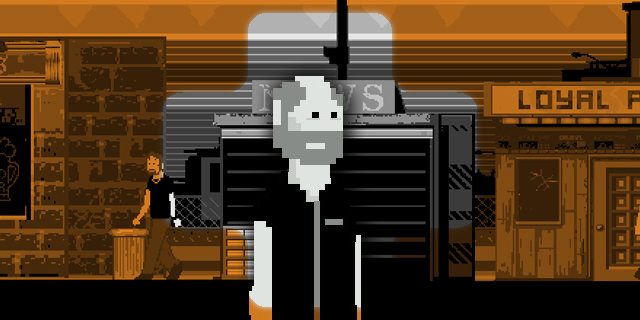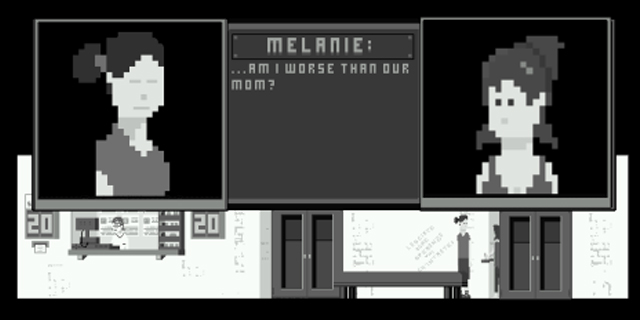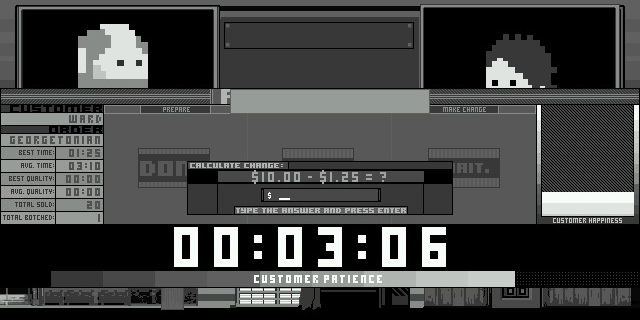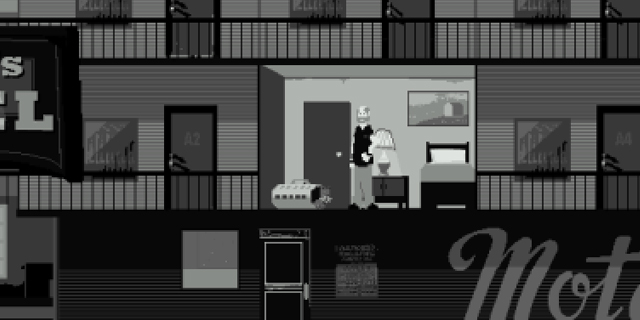
I’m not a big fan of PC gaming, at least not anymore. Yet, every now and again, a small title comes along that catches my attention and practically begs me to play it. These are usually indie darlings with a lot of interesting elements that lead to an uneven, but ultimately rewarding experience. Cart Life, a “retail simulator for Windows” that was released back in 2011, is one such game. It’s a title that demands so much, but in return gives you a look at the life of a character with a somewhat common and compelling story to tell.
Above all else, Cart Life demonstrates that you can ask the player to embark on the most tedious of journeys, if the end goal is ultimately something worth caring about.
The game tasks you with controlling one of three characters for a week of their lives. These characters include Andrus, a recent immigrant who travels to America to get away from his past and start a new life, and Melanie, a recent divorcee who wants nothing more than to support her daughter. The stories are deeply personal in a way that you rarely see from games (with some exceptions, like last year’s Papo & Yo), and because of that, it’s easy for me to overlook the title’s flaws and embrace the tedium of working a retail job.

No matter which character you choose, you ultimately have a single mission: to run a cart, whether it sells newspapers or coffee, and let that support your life no matter what the character’s end goal is. Andrus wants to make money to pay his rent and be able to feed his cat, who is his sole companion through this strange and stressful adventure into American society. Melanie needs to have a stable job in order to prove to a judge that she can take care of her daughter, thus preventing her ex-husband from taking sole custody. It can be downright devastating at times, but in a way that makes you pick yourself back up again and keep at it.
I have no experience working a retail job myself, but I can imagine its depiction in Cart Life is fairly realistic of the day-to-day process most people find themselves going through when working similar jobs. Once you have your cart, the gameplay becomes as basic as it gets. Customers come up to the stand, ask for a product, and you sell it to them. You do this by completing very repetitive tasks such as typing out a key phrase or solving a basic math problem and then moving on to the next customer in line. Each character has specific things they must accomplish alongside that, but it boils down to a very singular task that you must do over and over again until it’s time to go home, sleep, and do it again the next day.
The game isn’t fun, but like with any job reliant on its employees doing repetitive tasks, you will eventually zone out and get into a grove with the work. At some point I found myself compelled to keep going, not out of an interest to continue the gameplay, but to see these characters succeed. The story beats that encapsulate Cart Life make the tedium that surrounds those moments worthwhile. It’s almost pleasurable to see your character succeed when they may have previously failed. Like I said, the game isn’t purely about fun, but it becomes more captivating once you let the game’s systems and core narrative wrap themselves around you.

Some players will give up on the game once they quickly realize just how tedious and overwhelming it is, but I think it was a smart move on the part of the developer to make sure you never catch a break and you always have challenges ahead of you. Not only do you need to worry about making money, but the game never once holds your hand. Characters tell you places to go and you are often given other objectives to accomplish, but you have no in-game quest log to refer to; you have to remember things as they are told to you or as they happen.
You will most likely be completely lost once you get a chance to go into the hub world, and with time moving by at a frantic rate, you don’t have much opportunity to explore past the first day or so. Different stores will open and close at specific times, and the time to travel from place to place tends to add up. Before you know it, the day will be over and, on a bad day, you’ll have gone around the city and accomplished absolutely nothing. In some games this won’t be that big of a deal, but the key to success in Cart Life is being able to figure out how to manage your time. It’s not easy, but that’s the point: the arduous nature of its systems is intentional, but achieving those goals is that much more rewarding as a result.
Cart Life’s unwillingness to compromise to those who expect the game to hold your hand or give you any kind of leeway is part of why it succeeds. Many people don’t play games to be stressed out or deal with repetitive tasks that they may find more befitting a job than a form of entertainment, yet those things do not feel out of place here. It takes chances that only an indie game could, but it succeeds where others have failed. It’s brilliantly written and constructed in a way that makes you care about the characters, even from the onset. You may never find yourself in their shoes or even be able to relate to their problems, yet you want to see them succeed no matter what.

Crafting a complex narrative around a game that is full of systems which are ultimately designed to punish you for making mistakes is an interesting approach. I don’t want to say I found myself addicted to the plight of these characters and the tedious gameplay that surrounds their stories, but I couldn’t help but keep playing. Starting up Andrus’ story, I ended up losing track of time and, by the time the credits had started rolling, it was 3 a.m. I found pleasure in continuing to explore every facet of these carefully constructed and intricate systems despite the gameplay’s attempts to push me away, whether intentionally or unintentionally.
I don’t want more games to copy Cart Life’s formula, yet its willingness to do something different, even if some find the end result stressful and not worth pursuing, it something I can’t help but admire. While it isn’t the first game to demonstrate this, it shows that games don’t always have to be fun to succeed. Narrative has become such an integral part of our medium and the stories that actually succeed sometimes don’t always attempt to entertain, at least not in the traditional sense. Hopefully we see more brave developers taking a stab at trying something that doesn’t always cater to our most basic sense of what video games should be. Sometimes it’s simply worth it to try telling a story and forcing the player to understand that story through a specific perspective. After all, it is possible to add pleasure to the tedium.



















